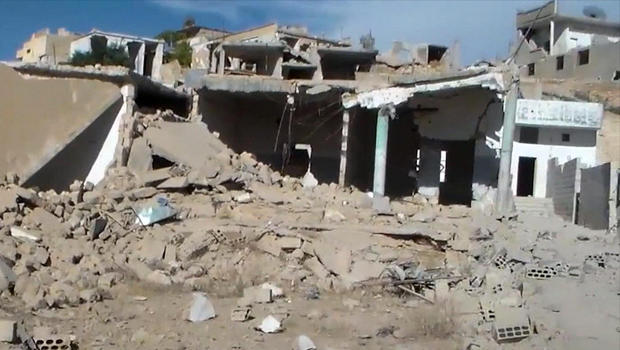U.S. casts doubt on Russian claims of targeting ISIS
WASHINGTON -- Defense Secretary Ash Carter said Wednesday that the Russian airstrikes in Syria appear to have targeted areas that do not include fighters with the Islamic State of Iraq and Syria, a development which Secretary of State John Kerry said would cause "grave concern" for the United States.
Kerry told the United Nations Security Council that the U.S. would not object to Russians hitting ISIS or al Qaeda targets but airstrikes just to strengthen the hand of Syrian President Bashar Assad would be worrisome.
"It does appear that they were in areas where there probably were not ISIL forces," Carter said of the Russian airstrikes, using an acronym for the Islamic State of Iraq and the Levant, another name for ISIS. He would not go into more detail.
The top national security officials spoke as Russia launched its first airstrikes in Syria targeting what it said were ISIS positions. On Wednesday, some U.S.-backed rebel groups claimed they were hit by Russian airstrikes but those claims could not be confirmed.
A commander in the Free Syrian Army, Col. Abdel Jabbar al-Akaidi, didn't believe that Russia was in Syria to fight ISIS, CBS News correspondent Holly Williams reports.
"The Russians are not here to fight ISIS but to hit the Syrian opposition," said al-Akaidi, adding that "the Russians will be treated as occupiers."
Al-Akaidi also said that "Syria is not Grozny," a reference to the capital of Chechnya, where Russia has fought two wars with separatists and has seen numerous deadly terror attacks in the past by Islamic militants.
A moderate Western-backed Syrian rebel group said one of its leading officers was killed in the airstrikes. The group said on its website that Iyad al-Deek died in an airstrike in the rural north of Homs. Al-Deek was an officer in the Syrian army but defected soon after the Syrian revolution turned into a war in 2011.
The group didn't provide any more details.
Khaled Khoja, the leader of the main Western-backed Syrian opposition group, the Syrian National Coalition, condemned the airstrikes as "Russia's military aggression."
Khoja accused Russia of targeting civilians instead of ISIS. Khoja said Russia is "using its military force to support the Assad regime's war against civilians. And it risks implicating itself in war crimes."
The opposition leader urged the international community to call for "the enforcement of a ban on aerial bombardment" in Syria but didn't further specify the scope of such a ban. He also said he was writing to the U.N. Security Council to demand urgent action.
At the Pentagon, Carter said the strikes highlight a contradiction in Russia's approach. He said the Russians should not be supporting the Assad government, and their military moves are "doomed to fail."
(Below, watch aerial video of the airstrikes posted by the Russian Defense Ministry)
"If Russia's recent actions and those now ongoing reflect a genuine commitment to defeat (ISIS) then we are prepared to welcome those efforts and to find a way to de-conflict our operations and thereby multiply military pressure on ISIL and affiliated groups," Kerry said. "But we must not and will not be confused in our fight against ISIL with support for Assad."
Carter also expressed disappointment that the Russians did not use formal channels to provide the U.S. with advance notice of its airstrikes, but instead sent an official to the U.S. Embassy in Baghdad.
"By supporting Assad and seemingly taking on everyone who is fighting Assad, you're taking on the whole rest of the country of Syria," Carter said. "That is not our position. At least some parts of the anti-Assad opposition belong in the political transition going forward. That's why the Russian approach is doomed to fail."
White House spokesman Josh Earnest said the new action "calls into question their strategy, because when President Putin and President Obama had the opportunity to meet at the U.N. earlier this week much of their discussion was focused on the need for a political transition inside Syria."
Kerry said Russian operations must not support Assad or interfere with those of the U.S.-led coalition that is already attacking ISIS targets. He called for an urgent start to military-to-military talks to prevent any kind of conflict between Russia and the coalition, suggesting they begin this week.
"Moreover, we have also made clear that we would have grave concerns should Russia strike areas where ISIL and al Qaeda-affiliated targets are not operating," he said. "Strikes of that kind would question Russia's real intentions fighting ISIL or protecting the Assad regime."
Kerry also said the U.S.-led coalition would "dramatically accelerate" its efforts.
Russian Foreign Minister Sergey Lavrov followed Kerry, saying Russia is ready to "forge standing channels of communication to ensure a maximally effective fight." He listed countries with a key role to play in resolving the chaos in Syria, including Iran, Russia, Saudi Arabia, Turkey, Egypt, Jordan, Qatar , the U.S. and China.
